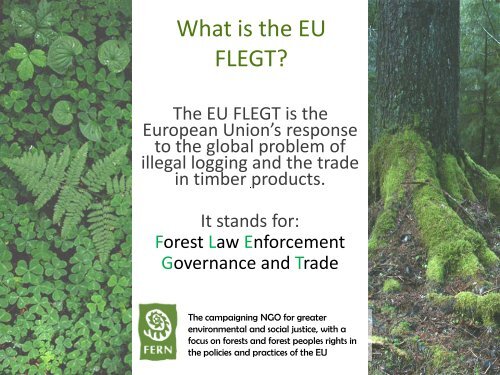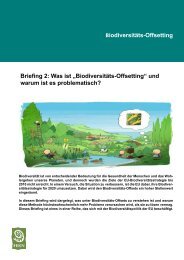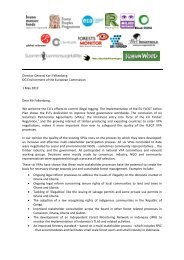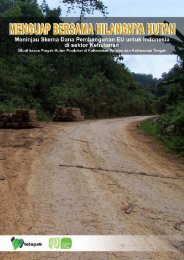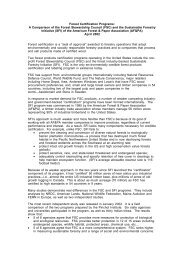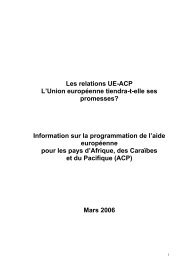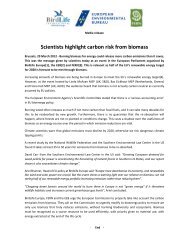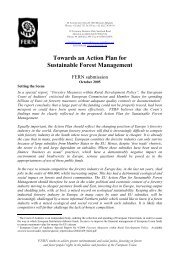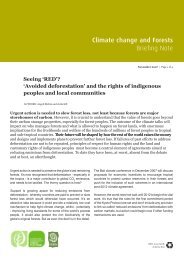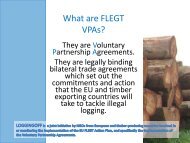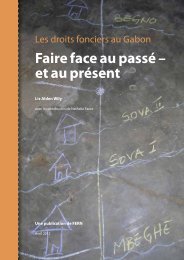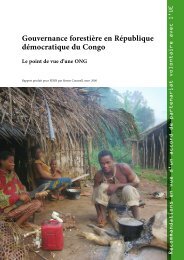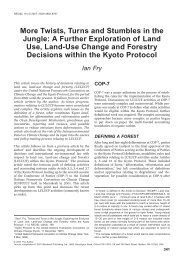What is EU FLEGT.pdf - Fern
What is EU FLEGT.pdf - Fern
What is EU FLEGT.pdf - Fern
Create successful ePaper yourself
Turn your PDF publications into a flip-book with our unique Google optimized e-Paper software.
<strong>What</strong> <strong>is</strong> the <strong>EU</strong><br />
<strong>FLEGT</strong>?<br />
The <strong>EU</strong> <strong>FLEGT</strong> <strong>is</strong> the<br />
European Union’s response<br />
to the global problem of<br />
illegal logging and the trade<br />
in timber products.<br />
It stands for:<br />
Forest Law Enforcement<br />
Governance and Trade<br />
The campaigning NGO for greater<br />
environmental and social justice, with a<br />
focus on forests and forest peoples rights in<br />
the policies and practices of the <strong>EU</strong>
<strong>EU</strong> <strong>FLEGT</strong> – a h<strong>is</strong>tory<br />
• In 1998, the G8 foreign min<strong>is</strong>ters’ launched an<br />
“action programme on forests”.<br />
• In April 2002, the European Comm<strong>is</strong>sion hosted<br />
an international workshop to d<strong>is</strong>cuss how the <strong>EU</strong><br />
should combat illegal logging.<br />
• In December 2002, FERN and the Royal Institute<br />
of International Affairs presented a blueprint for<br />
an <strong>EU</strong> Action Plan, called Options for Europe.<br />
• On 21 May 2003, the Comm<strong>is</strong>sion presented its<br />
<strong>FLEGT</strong> Action Plan, adopted by the Council in<br />
October 2003 with a set of conclusions.<br />
The campaigning NGO for greater environmental and social justice, with a focus on forests and<br />
forest peoples rights in the policies and practices of the <strong>EU</strong>. V<strong>is</strong>it us as www.fern.org
The <strong>EU</strong> <strong>FLEGT</strong> Action Plan<br />
The action plan sets out a range of measures that<br />
aim to combat the problem of illegal logging,<br />
including:<br />
1. Government Procurement Policies<br />
2. Financial due diligence<br />
3. Voluntary Partnership Agreements (VPAs)<br />
between the <strong>EU</strong> and timber producing countries<br />
4. Illegal timber regulation (additional leg<strong>is</strong>lative<br />
options to control importation of illegal timber)
1. Government Procurement Policies<br />
• The Action Plan encourages <strong>EU</strong> Member States to address illegal<br />
logging via procurement policies to promote the use of legal and<br />
sustainably produced timber<br />
• In July 2010, six Member States had adopted social and<br />
environmental criteria into their procurement policies (Belgium,<br />
Denmark, France, Germany, the Netherlands and the UK)<br />
• In July 2010, the <strong>EU</strong> was developing its own procurement policy<br />
but so far it <strong>is</strong> very weak, as <strong>is</strong> the <strong>EU</strong> Ecolabel for timber products<br />
as its requirements are lower than those of the six Member States.<br />
See <strong>EU</strong> Ecolabel allows forest destruction.<br />
More information can be found in the FERN report:<br />
Buying a sustainable future: timber procurement policies in the <strong>EU</strong>
2. Financial Due Diligence<br />
• The <strong>FLEGT</strong> Action Plan states banks, financial<br />
institutions and specifically ECAs should ensure r<strong>is</strong>k<br />
assessments and due diligence to ensure that large<br />
scale investment in the forestry sector does not<br />
increase illegal logging. See: Exporting destruction.<br />
• The Plan also mentions that <strong>EU</strong> Money Laundering<br />
Directives should treat illegal logging as a serious<br />
offence. Th<strong>is</strong> has, however, not been taken up, but<br />
some Member States could use national leg<strong>is</strong>lation<br />
such as money laundering and stolen goods to address<br />
the problem of illegal imports.
3. Voluntary Partnership Agreements<br />
• Legally binding bilateral trade<br />
agreements between timber<br />
producing countries (<strong>FLEGT</strong><br />
Partner Countries) and the <strong>EU</strong>,<br />
mostly known as VPAs.<br />
• VPAs set out the commitments<br />
and actions of both parties to<br />
tackle illegal logging, including<br />
measures to increase<br />
participation of non-state<br />
stakeholders and rightsholders,<br />
recogn<strong>is</strong>e rights of<br />
communities to the land and<br />
address corruption.<br />
VPAs should have the buy-in of national<br />
stakeholders, including NGOs, local<br />
communities, indigenous peoples, and the<br />
timber industry. They cons<strong>is</strong>t of three key steps:<br />
a) Defining legality, or deciding which laws will<br />
be enforced<br />
b) Designing a Legality Assurance System (LAS)<br />
(including timber tracking, government<br />
legality controls and external verification<br />
systems)<br />
c) Independent audits of the whole system.
a) Defining legality<br />
• The legality definition outlines the set of laws that will be<br />
enforced and monitored in the context of the <strong>FLEGT</strong> agreement.<br />
• ‘Legality’ <strong>is</strong> based on the laws and procedures of the timber<br />
producing country in question, and must include laws addressing<br />
social, environmental and economic <strong>is</strong>sues.<br />
• Definition must be developed through extensive participation<br />
of all stakeholders and rightsholders.<br />
In July 2010, all VPAs had achieved full stakeholder consent.<br />
Once there <strong>is</strong> an agreement on which laws should be<br />
checked, a Legality Assurance System (LAS) <strong>is</strong> set up<br />
to trace legal timber and ensure it <strong>is</strong> not mixed with<br />
illegal timber before export.
) Legality Assurance Systems (LAS)<br />
The LAS cons<strong>is</strong>ts of:<br />
• The "legality grid": A matrix which outlines the laws and the verifiers<br />
and indicators that will be used to monitor whether those laws are<br />
enforced.<br />
• Chain of custody: Control of the supply chain, or systems tracing wood<br />
products to ensure that timber from unverified operations does not<br />
enter the production chain<br />
• Verification of legal compliance: (Governmental or third party)<br />
verification of both legal compliance and traceability systems<br />
• Licensing: A <strong>FLEGT</strong> licence will be <strong>is</strong>sued on the bas<strong>is</strong> of evidence<br />
provided through chain of custody and verification<br />
• Independent audits to ensure the system <strong>is</strong> working. In some countries,<br />
independent monitoring complements audit by providing information on<br />
governance failures
The difference between independent<br />
audits and monitoring<br />
Independent audit: <strong>is</strong> a compulsory element<br />
of a VPA and its role <strong>is</strong> to check the system<br />
works.<br />
Independent Observation/Independent<br />
Monitoring: <strong>is</strong> not an integral part of the VPA,<br />
but in two of the three countries that have<br />
signed a VPA, Cameroon and the Republic of<br />
Congo, the need for an independent monitor<br />
<strong>is</strong> part of the VPA agreement. Th<strong>is</strong> monitor<br />
checks governance, including malfunctions in<br />
forest law enforcement and provides<br />
information to the independent auditor.<br />
Monitoring <strong>is</strong> carried out by independent<br />
organ<strong>is</strong>ations, often NGOs.
4. Illegal timber regulation<br />
In order to deal with the danger of<br />
illegally harvested timber entering<br />
the <strong>EU</strong> from countries that do not<br />
have a VPA, the <strong>EU</strong> has achieved<br />
political agreement to control the<br />
sale of all illegal timber, both<br />
imported and locally produced.<br />
Th<strong>is</strong> <strong>is</strong> called the ‘illegal timber<br />
regulation’, which includes a set of<br />
procedures that companies need<br />
to meet for timber and timber<br />
products to be traded in the <strong>EU</strong>.<br />
A Council Dec<strong>is</strong>ion <strong>is</strong> expected in<br />
September 2010.<br />
Key points of the regulation include:<br />
• A clause to prohibit the sale of<br />
illegally sourced timber for<br />
operators first placing timber and<br />
timber products on the <strong>EU</strong> market.<br />
• Operators placing timber products<br />
on the market for the first time will<br />
also be required to put 'due<br />
diligence' systems in place whilst<br />
secondary (or internal) traders will<br />
have to fulfill basic traceability<br />
requirements.<br />
For more information see the ClientEarth<br />
briefing Applicable leg<strong>is</strong>lation in the Illegal-<br />
Timber Regulation<br />
The campaigning NGO for greater environmental and social justice, with a focus on forests and<br />
forest peoples rights in the policies and practices of the <strong>EU</strong>. V<strong>is</strong>it us as www.fern.org
You will also find more information about<br />
<strong>FLEGT</strong> and other related <strong>is</strong>sues at<br />
http://www.fern.org/campaign/forest-law-andgovernance<br />
If you would like further information about<br />
the <strong>FLEGT</strong> action plan and how it <strong>is</strong> being<br />
implemented, please contact<br />
Iola Leal<br />
t +32 (0)496 205500<br />
e iola@fern.org<br />
The campaigning NGO for greater environmental and social justice, with a focus on forests and<br />
forest peoples rights in the policies and practices of the <strong>EU</strong>


